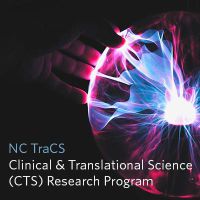Fine-tuning the social side of health research
A three-year research project will help doctors, researchers, and patients navigate the murky waters of socioeconomic health data.
Last year, Emily Pfaff was part of a team investigating who in the US had been diagnosed with Long COVID, which is when symptoms from a COVID-19 infection linger long after the initial illness is over. In part, they found that people living in wealthier ZIP codes were more likely to be diagnosed with lingering symptoms than people living in lower-income areas. But that data point alone may not tell a complete story.
"We don't actually think people who are in wealthier areas are more likely to have Long COVID," says Pfaff, an informatics researcher at the UNC School of Medicine and co-director of the Informatics and Data Science (IDSci) team at NC TraCS.
Emily Pfaff, PhD, MS
Instead, Pfaff suggests that this finding might be a result of health care access. People living in both high-income and low-income areas probably suffer from Long COVID at similar rates—but people in high-income areas may be diagnosed with Long COVID more often, possibly because wealthier areas have more specialists who are regularly diagnosing patients with this new and complicated condition.
But theoretically, it's also possible that wealthier people—for some still-unknown reason—are more likely to have lingering symptoms after a COVID infection. And if this were true, researchers would need to design and carry out a whole new study to figure out why wealthier people might be suffering at a higher rate.
While our understanding of medicine points us to the former explanation, by only analyzing income at the ZIP code level, instead of on the individual person level, we can't technically know which explanation is correct. And this situation isn't unique to Long COVID. While many scientists include socioeconomic factors in their medical research—what are commonly referred to as the "social determinants of health"—interpreting these data can be tricky. So now, Pfaff and Barbara Entwisle, a social demographer at UNC's Carolina Population Center, are spearheading a three-year project to decipher the nuances of social determinants of health data.
Barbara Entwisle, PhD
The project, funded with an Innovation to Impact Award under the CTS Research Program at NC TraCS, unites experts across UNC with the U.S. Census Bureau in a unique and innovative partnership that spans medical, sociological, statistical, and economic research. The goal is to create a set of guidelines and tools on how to best use socioeconomic information in research and clinical settings—lighting the way as medical professionals in North Carolina and beyond set out to learn how, exactly, the ways we live and work can affect our health.
"Researchers have started, over the past five to ten years, to really try to incorporate the social determinants of health into their research methods," Pfaff says. "But before we can do that, we need to understand how to collect, understand, and interpret those data—so that we don't end up making more mistakes in the end."
Scientists have found plenty of relationships between how people live and how healthy they are. Often, those relationships are even visible on a map, revealing health disparities between neighborhoods that differ in income, air quality, public transportation options, food access, noise levels, or housing availability, for example.
"There's a saying: If you want me to tell you how long you're going to live, tell me your ZIP code," Entwisle says.
Deciphering the nuances of data
But deciphering the nuances of these social determinants of health can be tricky. These problems can even plague something as seemingly straightforward as a drug efficacy study. Suppose a researcher was testing whether one asthma drug works better than another asthma drug, Pfaff suggests. The researchers could look at the question in a vacuum—do patients taking Drug A or Drug B have better health outcomes? But that approach might leave out some pertinent information.
"Maybe Drug B costs a whole lot more than Drug A," Pfaff says. "Maybe Drug B is only accessible to patients who have access to specialty care, like an academic medical center instead of an urgent care. What if, of the patients who were taking Drug A, more of them live in an area with really high levels of air pollution?"
Pfaff and Entwisle's project wants to make it easier for researchers to address these questions. To do so, they're analyzing and comparing socioeconomic and health data on people in North Carolina from three different sources: individual data gathered in patient health records, individual data gathered by the U.S. Census Bureau, and geographic data at the Census tract and ZIP code level.
This type of analysis has been difficult to undertake before, in large part because access to the Census Bureau's data is highly protected, with severe limitations on who can use the information. But Entwisle has worked closely with the Census Bureau, and her experience gave the UNC team a unique opportunity to propose this groundbreaking research project.
Pfaff also says that the CTS Research Program through NC TraCS offers a good venue for tackling these kinds of translational science questions. Because this award provides up to three years of funding, it enables the team to take on a project with such a long timeframe. And many of the translational science experts at NC TraCS have helped to drive this work along, including the Informatics and Data Science, Patient and Community Engagement in Research, Qualitative Research Service, Recruitment and Retention, Team Science, Research Coordination and Management Unit (RCMU), and ADAPT program teams.
This project's team wants to help researchers understand how to use different kinds of data on the social determinants of health. Each of the three sources they're looking at—health records, Census Bureau data, and geographic data—contains different information, collected in different ways.
For instance, the Census Bureau might ask someone "How did this person usually get to work last week?", which a person might answer by saying "car," "bus," "bicycle," or "subway." But at the doctor's office, where they want to understand a person's health, that question might be worded slightly differently, perhaps something like "Do you regularly have trouble getting to work?" This project will help researchers understand how to interpret the answers to these different kinds of questions and determine which dataset might be most appropriate for the research questions they're trying to answer.
By linking the three datasets, the team will also be able to see who's covered in each dataset and who isn't. For instance, there may be groups of people who aren't normally asked social determinants of health questions when they go to the doctor, or groups who are asked but often choose not to answer, meaning they'd be left out of any research done with those data.
Diabetes as a case study
The second stage of this project will use diabetes as a case study to understand how these socioeconomic data can inform health research. The team will look at how a few different factors—household income, whether the person lives alone, neighborhood poverty and measures of structural racism—are associated with how well a person is managing their diabetes.
By studying these questions with the data from both health records and the Census Bureau, the team will be able to see some of the nuances in these relationships that might get lost in an analysis with just one dataset. In addition, they'll look at how individual-level impacts on diabetes might be affected by geographic factors. Maybe, for example, patients with low incomes who live in wealthy neighborhoods tend to fare better than patients with low incomes who live in low-income neighborhoods, or vice versa.
As the project concludes, the team will put together a toolkit to help researchers think about how to use and analyze social determinants of health data. The point isn't to show that one type of dataset is better than another, or that any one variable impacts a person's health more than another, but rather to help researchers understand exactly what these data can and can't tell us.
Collecting the data — improving the process
The final part of the project takes this endeavor one step further. Researchers on the project will be speaking with primary care providers, medical assistants, patients, and caregivers at various clinics in the UNC health system, working to understand how social and economic information is collected.
MaryBeth Grewe, MPH
"We're trying to hear from these key players in their own words, what it's like for them to either ask the questions as healthcare providers or to answer those questions as patients and caregivers," says MaryBeth Grewe, Program Manager of the NC TraCS Qualitative Research Service and research specialist with the NC TraCS Patient and Community Engagement in Research (PaCER) program.
This data-gathering process can be important. For example, some patients might hesitate to tell their doctor about various challenges they're facing. But if they don't tell their doctor what's going on, the reality of their situation wouldn't show up in the health record, and researchers wouldn't have an accurate understanding of the challenges facing the local population.
"We do all this research with social determinants of health data from the medical record, but do people know how accurate that is?" Grewe says. "Maybe this can shed some light."
By figuring out what's working well and what's not working well for both patients and healthcare providers, the team wants to help clinics understand how they can improve their process of collecting this data.
And beyond supporting researchers and clinicians, this project will help the people of North Carolina. Across the state, from the UNC Medical Center in Chapel Hill to a rural clinic, people come to see their doctor not as patients with a list of vital signs, but as people—people who live in homes, spend time with friends, and work with colleagues. These people may breathe clean or dirty air, make a little or a lot or no money, and live in places full of greenery or in corners of a city mostly surrounded by concrete.
By unveiling the nuances and insights of socioeconomic and health data, this project could help translate the enormity of people's lives into new horizons for medicine and cutting-edge science. At the same time, it could help each person share these parts of themselves with the doctors, nurses, and scientists toiling every day to make their lives better—to make sure the details of each person's story don't get lost on the way to good health.
"It's a way to dream big," says Entwisle. "But also make a difference in the short run."
NC TraCS is the integrated hub of the NIH Clinical and Translational Science Awards (CTSA) Program at the University of North Carolina at Chapel Hill that combines the research strengths, resources, and opportunities of the UNC-Chapel Hill campus with partner institutions North Carolina State University in Raleigh and North Carolina Agricultural and Technical State University in Greensboro.


